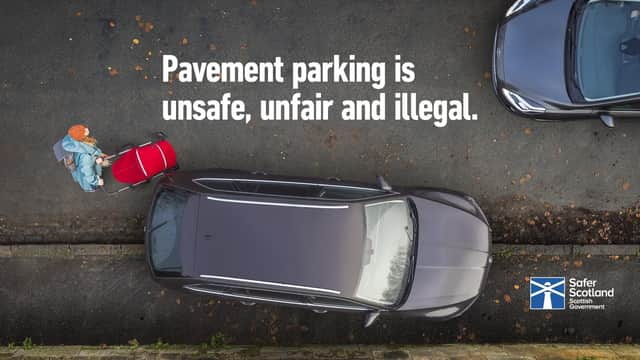Aberdeenshire Council urges motorists to take heed as pavement parking ban is introduced


The Transport (Scotland) Act 2019 bans pavement parking, double parking and parking at dropped kerbs, with certain exemptions designated by local authorities - for example to ensure safe access for emergency vehicles.
Local authorities will begin enforcing the law which means drivers could be fined £100 for such parking offences, reduced to £50 if paid within 14 days.
Advertisement
Hide AdAdvertisement
Hide AdAberdeenshire Council has completed an assessment of all its footways and has made a small number of exemption orders which will be in place for the prohibition coming into force.
While the council will be enforcing the prohibition, initially its focus will be around the education of motorists across the region.
Philip McKay, Head of Roads and Infrastructure Services, explained: “Many people face daily difficulties with pavement parking which can be dangerous and frustrating. Unfettered access along a footway is important for us all, but especially so for those with additional mobility needs, should that be due to physical difficulties or the need to navigate with a pram or wheelchair. Even if you think you have left enough space, only parked two wheels on the pavement or you won’t be parked for long, pavement parking can have harmful consequences to people who use the pavement.”
Pavement parking can force people to take unnecessary risks, such as:
- People using wheelchairs without access to dropped kerbs can fall over or be forced onto the road
- Families with children and buggies can be forced onto the road, increasing their risk of getting hurt
Mike Harrison has been a wheelchair user following a cycling accident 17 years ago.
He said: "Vehicles on the pavement can be just a nuisance and they can be a severe obstacle. It increases my journey time, I'm often in danger of scratching my hands on a wall, or vegetation sticking out makes it difficult to get past. Once you're on the road, of course, you're more vulnerable, especially if the traffic is coming up behind me. The new enforcement will make it clear to people what is required and will make journeys safer and more convenient."
Advertisement
Hide AdAdvertisement
Hide AdMichael Tornow is blind and has a guide dog, Pebbles. He also has a hearing impairment and uses hearing aids.
He said: “Pavement parking makes me frustrated. It's just very tiring trying to navigate around parked cars. And not just for me, but for others - people in wheelchairs, people pushing buggies. It's just not very considerate. As somebody who is completely blind, that's meant stepping out into the road. That's obviously quite dangerous, sometimes not being able to hear because of traffic noise. I hope the new enforcement will make people understand that pavement parking is both unsafe and unfair.”
Minister for Transport Fiona Hyslop said: “The message here is clear: pavement parking is unsafe, unfair and illegal, and you could be fined up to £100 for it. Local authorities can begin to issue fines from 11 December. We’re highlighting the danger that illegal pavement parking poses to pavement users, and in particular those with mobility issues or visual impairments, or parents pushing prams and buggies.”
For further information visit www.aberdeenshire.gov.uk/pavementparking/